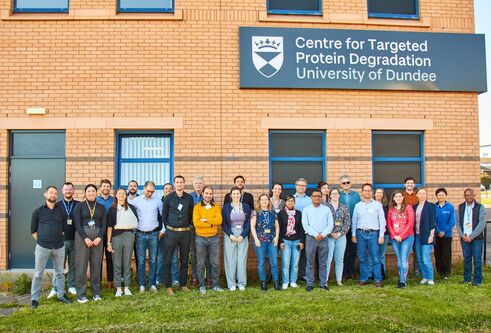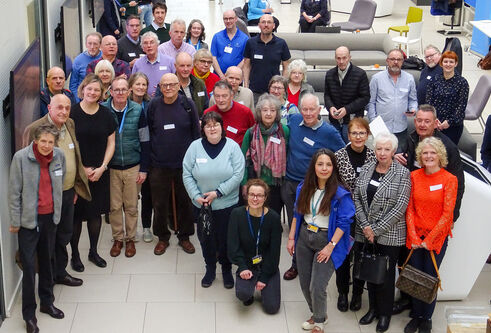Dr William FarnabyMRSC
Principal Investigator
Centre for Targeted Protein Degradation, School of Life Sciences

Contact
Biography
Will Farnaby is a Principal Investigator within the Centre for Targeted Protein Degradation. He has recently been awarded EPSRC New Investigator and Wellcome Trust Early Career awards, supporting his long-term vision for using induced proximity chemistry to address and understand diseases of the central nervous system. Previously, Will led a large Targeted Protein Degradation drug discovery team, as part of a collaboration between the University of Dundee and Boehringer-Ingelheim. He has been a key contributor to major, highly cited advances in the field of targeted protein degradation and in particular in the area of structure based PROTAC design. Prior to this he co-invented multiple clinical candidates for CNS diseases as a medicinal chemist at Takeda.
Research
Diseases of the Central Nervous System (CNS) affect millions of people globally. In the UK alone, neurodegenerative diseases will affect 2 million people by 2051 and have very limited effective treatments. We seek to discover a new generation of chemical tools to better understand and address CNS diseases.
Currently, molecules used to treat and understand CNS diseases typically act by binding to critical sites on target proteins to block or inhibit their function. In contrast, small molecules that can induce proximity of target proteins to other ‘effector’ proteins are able to regulate target proteins in many other ways beyond just inhibition. This concept has revolutionised drug discovery and chemical biology and offers new paradigms for understanding and treating disease.
Projects in the Farnaby lab combine novel chemistry with cellular and chemoproteomic profiling to identify new chemical probes that can illuminate, validate or de-risk therapeutic concepts, mainly in the area of central nervous system diseases. Our projects are multi-disciplinary in nature, combining expertise across synthetic and medicinal chemistry, cellular assay development, structural biophysics and small molecule mechanism of action studies. We a very collaborative and interface with both academic and industry partners to maximise the potential impact of our work for the scientific community and societal benefit.
Selected Publications
*co-corresponding author, $co-lead author
1. Kofink, Nicole Trainor, Barbara Mair…Harald Weinstabl, *William Farnaby. A selective and orally bioavailable VHL-recruiting PROTAC achieves SMARCA2 degradation in vivo. Nat Commun 13, 5969 (2022) doi: 10.1038/s41467-022-33430-6
2. $William Farnaby, Manfred Koegl...Darryl B. McConnell & Alessio Ciulli. BAF complex vulnerabilities in cancer demonstrated via structure-based PROTAC design. Nat. Chem. Biol. 15, 7, 672-680 (2019) doi: 10.1038/s41589-019-0294-6
3. $William Farnaby, Johannes Popow...Peter Ettmayer & Alessio Ciulli. Targeting cancer with small molecule pan-KRAS degraders. Science (2024). In Press. BioRXIV pre-print available at DOI: 10.1101/2023.10.24.563163
These studies are major outputs from a drug discovery team Will led focussed on using small molecule degraders to address high profile oncogenes, resulting in new benchmarks in the TPD field for structure based PROTAC design and optimisation of orally/in vivo active degraders.
4. Tatsuki Koike…William Farnaby…Takanobu Kuroita. Discovery of Soticlestat, a Potent and Selective Inhibitor for Cholesterol 24-Hydroxylase (CH24H). J. Med. Chem. (2021) 64, 16, 1222812244 doi: 10.1021/acs.jmedchem.1c00864
This paper describes the discovery of Soticlestat, a CH24H inhibitor Will co-invented via structure- based drug design and currently undergoing Phase 3 clinical trials for Dravet’s Syndrome.
5. Mayol-Llinas… *William Farnaby. Assessing molecular scaffolds for CNS Drug Discovery. Drug Discov Today (2017) 22, 965-969. DOI: 10.1016/j.drudis.2017.01.008.
This paper describes work from an industry-academic collaboration Will led whilst in industry, focussed on developing methods to generate novel, CNS focussed screening libraries.
Research projects
Project lead
Research project
LRRK2 Investigative Therapeutics Exchange (LITE) is a new academic-industrial global network supported by the Michael J Fox Foundation for Parkinson’s Research.
PhD Projects
Principal supervisor
Second supervisor
Awards
| Award | Year |
|---|---|
| PiCLS Best Mentor Award | 2023 |
Stories
Press release
Ground-breaking drug discovery work at the University of Dundee has been honoured by a major international award.

News
Over 50 researchers, people with Parkinson’s, and carers came together at an Open Day on 6th February 2024 to discuss the latest Parkinson’s research in Dundee, tour different labs and facilities, and connect over lunch.

News
Review of the Year 2023 took place this week with the Dean, Julian Blow sharing the highlights of activity within the School from 2023.